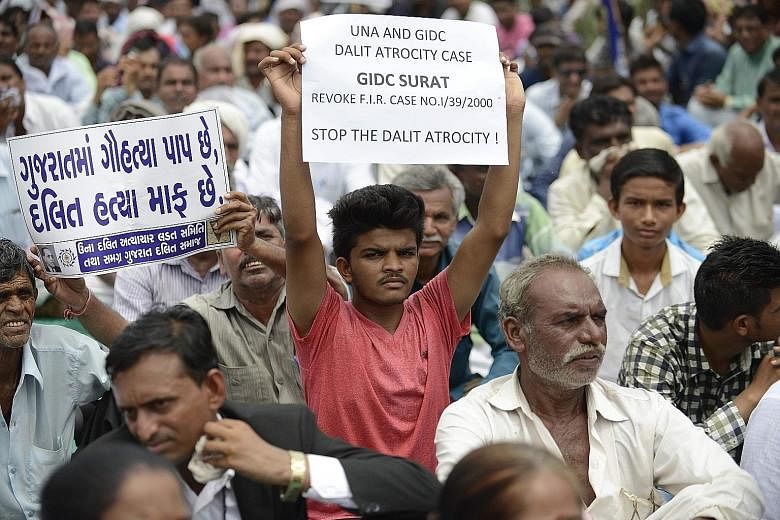When a people, forced for centuries to do "dirty" jobs that their oppressors shun such as removing cow carcasses and skinning them, are thrashed for doing precisely that, the result is rage.
For the past few weeks, India's Dalits, formerly known as untouchables, have been up in arms.
They erupted in fury after a group of "cow protection vigilantes" in Una, Gujarat, caught four Dalit youths skinning a dead cow on July 11, tied them to an SUV and flogged them mercilessly for hours. The vigilantes filmed the act and circulated the video.
Atrocities against Dalits are commonplace. What is different this time is the unprecedented scale of protests by Dalits in Una, the rest of Gujarat state and other areas. Angry Dalits have swarmed the streets of Gujarat. Several swallowed poison out of frustration at their lives; one of them died later.
In protest, Dalits have left cow carcasses to rot on the roads, refusing to remove them. Some carcasses have been dumped outside government offices, with placards that read: "She is YOUR mother. YOU take care of her." Hindus regard the cow as their mother. Last Sunday, around 15,000 Dalits held a rally in Ahmedabad to protest against their treatment.
On social media, Dalit activists have been urging Dalits to take a solemn pledge to refuse to do some of their traditional jobs, such as skinning cows and manually cleaning sewers.
"The solidarity I have seen, the united anger of so many Dalits is amazing. Something has snapped. We just can't take any more injustice," autorickshaw wallah Jagdish Raj told The Sunday Times over the phone from Ahmedabad.
Many liberals in India believe that the "cow politics" of the ruling Bharatiya Janata Party (BJP) has created a new vigilantism in the country. Right-wing Hindu groups believe that they have a licence, under the BJP government, to commit violence against anyone they think is "harming" the cow or eating beef.
The slaughter of cows is banned in most states. Hindus have attacked Muslims, as well as Dalits, in a series of incidents on the assumption that they were smuggling or eating beef. In the Una incident, the cow was already dead. A witness said a lion had killed it. In other incidents as well, the assumption had proved false.
Social media has helped Dalits come together to protest against injustices. Many have mobile phones and mobilise action using Twitter and Facebook. Before social media, it was hard for Dalits in one part of the country to know what was happening elsewhere. Now, news and videos of atrocities are shared instantly, galvanising activists and attracting mainstream media, which reports on the incidents.
"How long can Dalits go on doing the jobs that no one wants to do and, for that very reason, fail to have any respect? We won't stand for it any more," said Mr Paul Divakar, general secretary of the National Campaign on Dalit Human Rights in New Delhi.
The organisation's website has a running ticker that says 13 Dalits are murdered every week and three Dalit women raped every day. Across India, crimes against Dalits and other low castes rose by almost a fifth to 47,064 in 2014 from 2013, according to government data.
Everywhere, Dalits are denied entry to temples, forbidden to draw water from village wells, forced to use different glasses and plates from the upper castes in roadside eateries, and if they so much as demonstrate the slightest confidence or prosperity, they run the risk of being whipped.
In Mr Raj's case, he first bought an autorickshaw three years ago. He proudly took it back to his village, where it was parked in a cordoned-off area where Dalit families live.
"A gang of Brahmins came one morning and set fire to it. They told me to remember who I was and not get big ideas," said Mr Raj, who has since bought a new autorickshaw with money borrowed from relatives.
For some sociologists, this is the crux of the current agitation - that Dalits, although still at the bottom of the social pile, are gradually becoming better educated and less willing to accept the old social order.
Some Dalit entrepreneurs are millionaires. Young Dalits refuse to accept the "inferiority" thrust on them by the caste system. With these changes, more points of conflict are being created.
"On the one hand, economic and social change has transformed Dalit lives in many contexts. But the one thing we know from comparative sociology is that conflict increases precisely at the moment where social conditions might be getting slightly better," wrote commentator Pratap Bhanu Mehta in the Indian Express.
Dalit author and political analyst Chandra Bhan Prasad believes that young Dalits have new aspirations and will not wait.
"These protests are an expression of frustration that the old order is still around. Change has been too slow. They are on the Internet so they know that India is alone in allowing this kind of discrimination."

